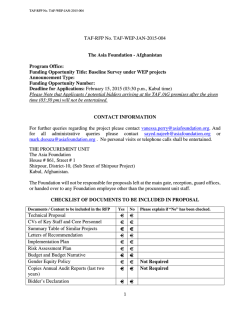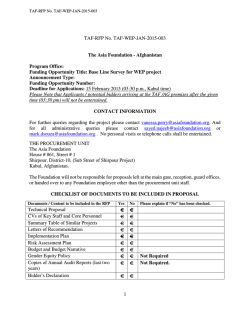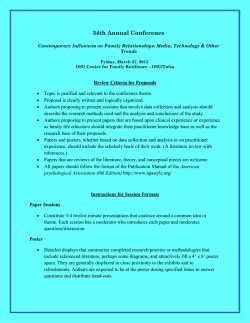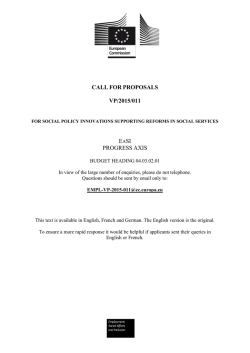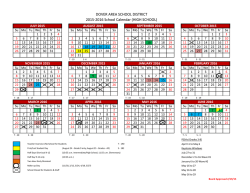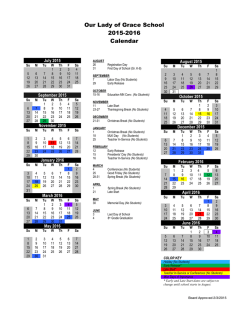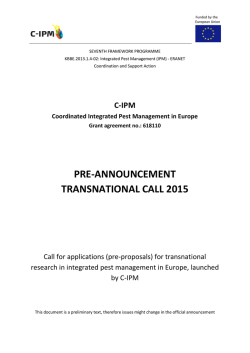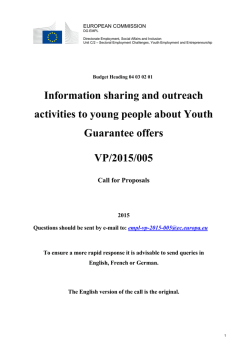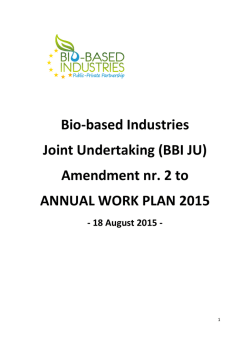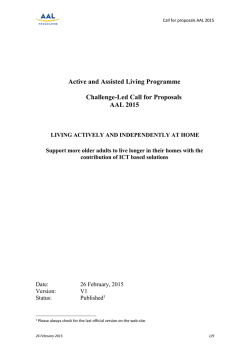
CALL FOR PROPOSALS Operating Grants for 2016 Open
EUROPEAN COMMISSION Employment, Social Affairs and Inclusion DG Disability and social inclusion Social inclusion Promoting Non-discrimination and Equality RIGHTS, EQUALITY AND CITIZENSHIP PROGRAMME (2014-2020) CALL FOR PROPOSALS Operating Grants for 2016 Open to EU-level networks active in the area: rights of persons with disabilities having signed a Framework Partnership Agreement 2015-2017 under the Call JUST/2014/SPOB/OG/NETW Period covered: 01.01.2016 – 31.12.2016 VP/2015/013 Questions should be sent by e-mail only to: [email protected] To ensure a more rapid response it is helpful if applicants send their queries in English, French or German. 1 1. INTRODUCTION This call for proposals concerns the Regulation (EU) No 1381/2013 of the European Parliament and of the Council of 17 December 2013 establishing a Rights, Equality and Citizenship Programme for the period 2014 to 2020 ('REC Programme')1. It implements the respective activities set out in the 2015 Annual Work Programme for the REC Programme adopted on 30 March 2015, and aims to fund proposals with EU added value. Organisations interested in submitting applications are strongly advised to study the detailed terms and conditions set out in this call for proposals and in the Financial Guidelines for Applicants to Operating Grants published together with this call, and constituting an integral part of the conditions of the call. 2. PURPOSE OF THE CALL This call for proposals aims to provide operating grants for 2016 under the Framework Partnership Agreements concluded for the period 2015-2017 to provide for long term cooperation between the European Commission and EU-level networks active in the promotion of rights of persons with disabilities. The call will provide grants to fund operating costs and those activities of the network which have EU added value and contribute to the implementation of the objectives of the REC Programme. The Framework Partnership Agreements were signed in 2015 following the call for proposals JUST/2014/SPOB/OG/NETW. They set out the framework conditions governing potential operating grants and encompass a triennial strategic action plan proposed by the EU-level networks and accepted by the European Commission. 3. POLICY CONTEXT AND PRIORITIES One in six people in the European Union – around 80 million – have a disability that ranges from mild to severe. These numbers are set to rise as the EU population grows progressively older. Many people with disabilities are all too often prevented from fully participating in society and the economy because of physical or other barriers, as well as discrimination. The European Commission promotes the active inclusion and full participation of disabled people in society, and adopted in 2010 the European Disability Strategy 201020202. This Strategy identifies actions at EU level to complement and support national efforts in eight priority areas: (1) Accessibility, (2) Participation, (3) Equality, (4) Employment, (5) Education and Training, (6) Social protection, (7) Health, and (8) External Action. It is underpinned by awareness-raising, financial support, statistics and data collection. 1 2 OJ L 354, 28.12.2013, p. 64 http://ec.europa.eu/social/main.jsp?catId=1137&langId=en 2 The Disability Strategy aims to support the full and effective implementation of the UN Convention on the Rights of Persons with Disabilities (UNCRPD) by the EU and its Member States. The EU became a party to the UN Convention in 2011. The purpose of the Convention is to promote, protect and ensure the full and equal enjoyment of all human rights and fundamental freedoms by all persons with disabilities. The Commission published the first report on the implementation of the Convention by the EU in June 2014. In 2015 and for the very first time, a United Nations Committee is reviewing how the EU has been implementing its obligations. The activities of the networks should contribute to one or more of the following priorities: supporting the implementation of the priorities of the European Disability Strategy 2010-2020; contributing to the implementation of the UNCRPD and promoting the involvement of the national member organisations in the implementation; supporting the achievement of the Europe 2020 strategy targets on employment, poverty and education; supporting the development, implementation and monitoring of EU and national policies and legislation in the area of disability; contributing to mainstreaming different aspects of disability matters in the EU and national policies, particularly in the areas of employment, education, social inclusion, social protection, health, human rights, international cooperation and development to make sure that the rights and needs of persons with disabilities are properly addressed; contributing to improving accessibility to goods and services; contributing to the development of specific policies relevant to disabilities in the area of independent living, in particular as regards the transition from institutional to community-based care. In particular, the networks should focus on the following activities: equipping member organisations with the necessary skills and competences to promote the interests and rights of people with disabilities, in particular to enhance equality of opportunities for people with disabilities, namely in employment, and combat discrimination on the basis of disability; developing information tools (websites, publications or other means) to inform about EU objectives, policies and actions in the disability field, increasing the network capacity and raising public awareness; supporting national member organisations in their involvement in the implementation, at national level, of main political EU driven processes. Finally, the networks are expected to contribute to a number of specific initiatives where their role may have a clear added-value, such as: Work Forum on the implementation of the UN Convention on the Rights of Persons with Disabilities in the EU and the Member States; 3 European Commission Conference on the European day of persons with disabilities in December; European Full Participation Award (i.e. Access City Award). The proposed 2016 work programme should be coherent with the action plan 2015-2017 presented in the Framework Partnership Agreement; it must develop it further and describe its implementation in more detail. Minor adaptations due to changes in the overall context or unforeseeable organisational developments are possible and should be clearly indicated in the proposal, but the 2016 work programme cannot contradict the 2015-2017 action plan. 4. BUDGET AVAILABLE The total budget earmarked for the projects co-financing is estimated at 3,000,000.00€. The Commission expects to fund a maximum of 8 proposals. The Commission reserves the right not to distribute all the funds available. The maximum rate of EU support under this call is 80% of the total eligible costs of the work programme. 5. 5.1 EVALUATION PROCEDURE Admissibility criteria Applicants must comply with the following requirements: a) The grant application must have been submitted no later than the deadline set out under section 6 of this call for proposals. b) The grant application should be submitted using the online application "SWIM" (see section 7) and be accompanied by all the compulsory documents and annexes requested in section 8. Only applications which meet the above admissibility criteria will be further processed. 5.2 Eligibility criteria 5.2.1 Eligibility of applicants To be eligible, applicants must fulfil the following criteria: (a) Proposals can only be submitted by organisations having signed a Framework Partnership Agreement with the European Commission following the 2014 Call for 4 Proposals establishing three-year Framework Partnership Agreements for the period 2015-20173. If a grant application is declared ineligible, it will not be considered for further evaluation. 5.2.2 Eligibility of activities Applicants should keep in mind that the countries participating to the REC Programme are the following: All EU Members States Iceland Liechtenstein Activities taking place in other countries are therefore not eligible in this Call for proposals. However, where the Beneficiary can adequately justify that such activities are vital for the implementation of its annual work programme and maximise its European added value, and where they contribute to achieving the objectives of the funding programme, costs relating to participation in these activities could be accepted as eligible provided that they are incurred in a REC programme country, and subject to prior explicit approval by the Commission. The following activities remain non eligible, and will not be funded by the European Commission: sponsorships/scholarships to individuals for their participation in workshops, seminars, conferences, congresses, training courses etc.; activities supporting individual political parties; provision of financial support to third parties; legal actions before national or international courts regardless of their grounds or objectives. 5.3 Award criteria Proposals will be evaluated by an evaluation committee composed of Commission staff. The committee may be assisted by external experts. The submitted proposals will be evaluated solely on the basis of the award criteria outlined below. The award criteria aim to ensure the selection of proposals of high quality and which contribute as much as possible to the priorities of this call in a cost-effective manner. Synergies and complementarities with other EU instruments and programmes shall be sought and overlaps and duplications with existing activities avoided. Applications will be assessed against the following criteria: 3 http://ec.europa.eu/justice/grants1/calls/just_2014_spob_og_netw_en.htm 5 (a) Relevance and coherence (20 points): extent to which the activities and objectives of the proposed 2016 annual work programme address the priorities announced by the Commission and are coherent with the organisation's Action plan 2015-2017 annexed to the Framework Partnership Agreement; (b) Quality of the proposed activities (40 points): quality in terms of the proposed methodology for implementing the annual work programme; the roles and responsibilities and the division of tasks within the team; the arrangements taken for the evaluation and monitoring of the action; the identification of risks and the measures to mitigate them; the use of results and their appropriateness to the network's objectives for the 2016 work programme, including a clear, targeted and appropriate dissemination strategy; (c) European added value (20 points): the European added value of the activities shall be assessed in the light of criteria such as their contribution to the consistent and coherent implementation of Union law and policies and to wide public awareness about the rights deriving from it, their potential to develop mutual trust among Member States and to improve cross-border cooperation, their transnational impact, their contribution to the elaboration and dissemination of best practices or their potential to create practical tools and solutions that address cross-border or Union-wide challenges; (d) Cost-effectiveness (20 points): financial feasibility of the proposed activities by means of a clear, detailed, realistic and reasonable budget, coherent with the 2016 annual work programme of the applicant. Appropriateness of the amount requested in relation to the scale and type of the activities, to the expected results and to the size of the network. As a result of the evaluation carried out against the above award criteria the proposals will be ranked according to the points attained. The list of awarded proposals will be established based on the amount of budget available. Proposals not attaining an overall score of at least 70 points will not be considered for the award of a grant even if the available budget is not consumed fully. 6. TIMETABLE Stages Date or indicative period a) Publication of the call August 2015 b) Deadline for submitting applications Friday 16 October 2015 c) Evaluation period October-November 2015 d) Information to applicants November 2015 e) Signature of grant agreements December 2015 f) Starting date of the action/ work programme 1 January 2016 6 7. 7.1 HOW TO SUBMIT AN APPLICATION Application form Applications must be submitted using the compulsory electronic application form available on the Internet Web System SWIM at the following address: https://webgate.ec.europa.eu/swim This system allows the introduction, editing, validation, printing and submission of the application form. Once the application is submitted electronically, a copy must be printed out and signed by the legal representative of the organisation submitting the proposal, and must be sent to the Commission as explained below. Once the application has been submitted electronically, no changes are possible. For more information on how to use the SWIM application, you can consult the user's manual: http://ec.europa.eu/employment_social/calls/pdf/swim_manual_en.pdf 7.2 Submission formalities All the required documents listed in the check-list (section 8) must be submitted via the SWIM application: https://webgate.ec.europa.eu/swim/external/displayWelcome.do Please send your cover letter of application together with all originals of the required supporting documents to the address below by Friday 16th October 2015 (their submission date will be taken as the date of dispatch, as evidenced by the postmark or the express courier receipt date): a) by post to the following postal address: European Commission DG Employment, Social Affairs and Inclusion (Unit D-4) Call for Proposals VP/2015/013 EMPL-CAD Service B-1049 Brussels Belgium b) or by express courier service to the following delivery address: European Commission DG Employment, Social Affairs and Inclusion (Unit D-4) Call for proposals VP/2015/013 Central Courier Service Avenue du Bourget, 1 B-1140 Brussels Belgium Proposals may also be delivered personally against a signed and dated receipt to address (b) above, at the latest by 16:00, on Friday 16th October 2015. 7 The reference of the call for proposals must be indicated on the envelope. In case of hand-delivery, please keep the receipt signed and dated by the official in the Commission's central mail department who took delivery as proof of submission. This department is open from 08:00 to 17:00 from Monday to Thursday and from 08:00 to 16:00 on Friday. It is closed on Saturdays, Sundays and on Commission holidays. Failure to submit the application by post and via SWIM application by the submission deadline to the Commission will render the application inadmissible. Complementary documents sent by fax or e-mail will not be considered for evaluation unless requested by the European Commission. Any document sent after the deadline will not be accepted unless requested by the European Commission. The applicant's attention is drawn to the fact that incomplete or unsigned forms, handwritten forms and those sent by fax or e-mail will not be taken into consideration. 7.3 Questions related to the call All questions concerning this Call for proposals shall be addressed exclusively to the following mail-box: [email protected] Questions may be sent to the above address no later than 10 days before the deadline for the submission of proposals. The Contracting Authority has no obligation to provide clarifications to questions received after this date. Replies will be given no later than 5 days before the deadline for submission of proposals. All questions together with the answers and other important notices in the course of the evaluation procedure, will be published on the Europa website: http://ec.europa.eu/social/main.jsp?catId=629&langId=en. It is therefore advisable to consult the abovementioned website regularly in order to be informed of the questions and answers. Technical questions regarding the SWIM application should be sent to: [email protected] 8 8. CHECK-LIST OF REQUIRED SUPPORTING DOCUMENTS After submission of the application electronically via SWIM, please number the documents as shown in the table below and send them in duplicate (original + one copy or two copies where original is not required) before the submission deadline, as explained in point 8.2. Order Document 1 Original cover letter formally submitting the application for NO funding (please quote the call VP/2015/013) duly signed and dated by the legal representative of the applicant organisation. Print-out of the duly completed and submitted on-line YES application form – dated and signed by the legal representative. 2 Template to downloaded SWIM Note: The on-line form must be electronically submitted before printing. After the electronic submission no further changes to the application are possible. Original of the document "Annual work programme 2016" by YES using the mandatory template. The legal representative must sign and date the form. REC indicators following the template provided. YES 3 4 Original signed letter of commitment from the applicant stating YES its financial contribution to the work programme following the template provided. Where applicable4, the original of the document "Contracts for YES implementing the action" following the template provided. For grant applications where the costs to be financed exceeds NO EUR 100.000, an external audit report certifying the accounts for the last financial year available. 5 6 7 9. Annex I Annex II Annex III Annex IV indicators) ANNEXES TO THE CALL Financial Guidelines Model Grant Agreement Final Technical Report template Final technical report template annex: Quantitative Reporting (REC All Annexes are available on the Call's webpage, http://ec.europa.eu/social/main.jsp?langId=en&catId=629 4 be in accessible through: Implementing contracts for subcontracting which exceed the threshold of 5000€. 9
© Copyright 2026
